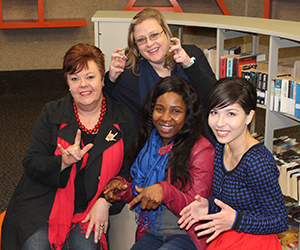Latest News Archive
Please select Category, Year, and then Month to display items
27 December 2019
|
Story Dr Cindé Greyling
|
Photo Supplied

KovsieInnovation at the UFS is bridging the gap between industry and academics with a powerful force. For too long, research remained an academic pursuit, with many innovative ideas stuck between the pages of a thesis – only to come alive during exclusive, short-lived conference proceeds.
KovsieInnovation
Recently, Gerard Verhoef, Director in the Directorate: Research Development (DRD), and his team from KovsieInnovation finalised their Innovation and Commercialisation Strategy in order to create a structured pathway for good ideas. The primary objective of KovsieInnovation – the UFS Innovation and Entrepreneurship Office – is to achieve sustainable growth in third-stream income from innovative research activities stemming from the UFS. “Potential successful ideas must be feasible, viable, and sustainable, and we formulated an eight-step plan to facilitate this,” Verhoef explains. Ultimately, the DRD wants to attract new and continuous research as a renowned academic knowledge partner that can foster, drive, and successfully commercialise innovative research activities; and in doing so, foster an entrepreneurial culture at the UFS.
Liquid Culture
One such success story is the development of Liquid Culture into a business of choice, supplying liquid yeast to breweries and bakeries. Christopher Rothmann and Dr Errol Cason are the driving forces behind this company that produces their sought-after and stable yeast product in the Department of Microbiology, Biochemistry and Food Biotechnology at the UFS. With world-class equipment and laboratories, they house one of the largest yeast-culture collections in the world.
Both Rothman and Dr Cason were home brewers for many years before starting to produce commercial batches. They believe it would not have been possible without the help of KovsieInnovation. This project was also one of the finalists in the National Entrepreneurship Intervarsity.
Christo Strydom Nutrition (CSN)
Another innovative way in which the UFS generates third-stream income via the DRD, is by partnering with already successful commercial products. One such example is the recent successful royalty agreement with CSN. With this transaction, the university unlocked its brand potential to the benefit of both the industry partner and the UFS. Quality assurance remains the key success factor for deals like this.
Largest group on African continent introduced to Sign Language
2016-07-05
 The introduction of basic Sign Language
The introduction of basic Sign Language
as part of the UFS101 course was a great
success. From left are Susan Lombaard,
Annemarie le Roux, Tshisikhawe Dzivhani
(all from the Department of South African
Sign Language), and Lauren Oosthuizen
(UFS101). Photo: Leonie Bolleurs
As a result of a new initiative at the University of the Free State (UFS), the largest group of students on the African continent took part in a first-year seminar which included Sign Language.
A total of 5400 students on the Bloemfontein Campus and 1000 on Qwaqwa Campus were taught basic Sign Language by Susan Lombaard, Acting Head of the Department of South African Sign Language, and her team members, Tshisikhawe Dzivhani, Annemarie le Roux, and Nicolene de Klerk.
It forms part of the UFS101 module presented to all first-year students. The initiative, begun in the first semester of 2016, will form part of UFS101 in future and was met with an overwhelmingly positive response.
Three segments of course
Sign Language was taught in three segments and positioned as large-class learning experiences in the Callie Human Centre (Bloemfontein Campus) and the Nelson Mandela Hall (Qwaqwa Campus). Students were taught about deaf culture, Sign Language theory, as well as how to sign their names, exchange pleasantries, and have a basic conversation.
A valuable skill to have
“It (the Sign Language experience) was very interesting and helpful,” said one of the students. “It is important to have the ability to communicate with all sorts of people, and to be able to help them in a crisis”. According to another, it sparked an interest in Sign Language. “It is a skill I will continue to use and try to learn more from it,” said a third.
Lombaard – in collaboration with the UFS101 team – will be presenting a paper related to this achievement at the DeafNet Africa Conference in Johannesburg, from 26 to 30 September 2016.